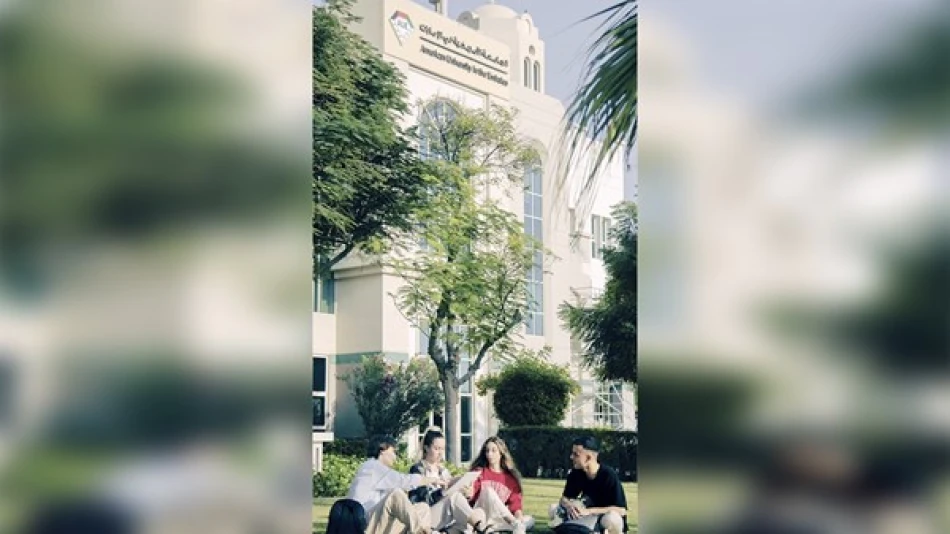
American University in the UAE Unveils Innovative Academic Programs for Upcoming Year
UAE University Pioneers World's First Desert and Mountain Studies College in Bold Academic Expansion
The American University in the Emirates is breaking new ground in higher education by establishing the world's first college dedicated to desert and mountain studies, alongside ambitious plans for a Peace and Conflict Resolution Center. This strategic expansion reflects the UAE's growing confidence as an educational hub and its commitment to addressing specialized global challenges through innovative academic programs.
Unprecedented Academic Specialization Takes Shape
Professor Dr. Muthanna Abdel-Razzaq, President of the American University in the Emirates, revealed that the groundbreaking Desert and Mountain Studies College will begin operations as early as September 2025, with a January 2026 launch as the latest target. The program aims to train engineers specifically for desert environments, recognizing the untapped wealth and potential of these landscapes.
This initiative represents more than academic novelty—it addresses a genuine gap in global expertise. As climate change intensifies focus on arid regions and mountain ecosystems, the UAE is positioning itself as the natural leader in this field, leveraging its geographic advantages and successful desert development experience.
Strategic Timing Meets Market Demand
The college's launch coincides with growing international interest in desert technologies, from solar energy projects in the Sahara to water conservation techniques in Australia's outback. Countries like Saudi Arabia and Jordan are investing billions in desert urbanization projects, creating immediate demand for specialized expertise that this program could supply.
UAE Emerges as Global Peace Education Hub
The planned Peace and Conflict Resolution Center capitalizes on the UAE's diplomatic reputation and neutral stance in regional conflicts. Abdel-Razzaq emphasized that the Emirates represents the world's most suitable location for such a center, given its commitment to dialogue over warfare.
This move mirrors successful models like Norway's peace facilitation efforts or Switzerland's conflict mediation role, but with a distinctly Middle Eastern perspective. The center could become instrumental in training the next generation of diplomats and peace negotiators, particularly as the region seeks sustainable solutions to ongoing conflicts.
Global Women's Council Addresses Educational Gaps
The university is simultaneously developing a Global Women's Council, currently in the charter-drafting phase, focused on enabling women in developing countries to complete their education while protecting them from violence and harassment. This initiative aligns with international development goals and could attract significant funding from global organizations prioritizing women's education.
Market-Driven Academic Innovation
The university's expansion strategy demonstrates keen awareness of emerging market needs. New programs include cybersecurity engineering, mechatronics, future studies, and business intelligence—all fields experiencing explosive growth in the Gulf region's diversifying economy.
The planned medical college represents perhaps the most ambitious expansion, utilizing private sector hospitals for clinical training. This public-private partnership model could prove more agile than traditional medical education approaches, potentially graduating doctors faster while maintaining quality standards.
Flexible Education Philosophy Challenges Convention
The university's policy allowing students to pursue graduate degrees outside their undergraduate specialization, with bridging programs lasting six months to a year, reflects modern career realities. This approach acknowledges that today's professionals often change fields multiple times, requiring adaptable skill sets rather than narrow expertise.
Regional Competition and Global Positioning
This expansion occurs as Gulf universities increasingly compete for international recognition. While Qatar focuses on branch campuses of Western institutions and Saudi Arabia invests heavily in research universities, the UAE is carving out a niche in specialized, practical programs addressing regional and global challenges.
The university's diverse student body—representing 60 nationalities with 65% UAE citizens—demonstrates successful integration of local and international perspectives. This model could prove attractive to other emerging economies seeking to build indigenous educational capacity while maintaining global relevance.
Investment Returns on Human Capital
The UAE's educational investments are yielding measurable returns, with the university producing ambassadors and professionals in fields previously dominated by Western-trained experts. This success validates the country's strategy of prioritizing human development over infrastructure alone.
As global rankings increasingly recognize UAE institutions, the country is transitioning from education importer to exporter, potentially attracting students from across Africa, Asia, and the Middle East. The specialized programs announced could accelerate this transformation, establishing the UAE as a destination for niche expertise rather than general education alone.
The university's ambitious expansion timeline—with multiple new colleges launching within two years—reflects both confidence in market demand and the UAE's characteristic approach to rapid, large-scale implementation of strategic initiatives.
Most Viewed News

 Layla Al Mansoori
Layla Al Mansoori






